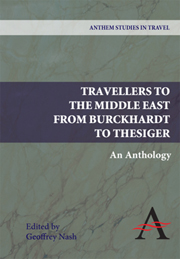Book contents
- Frontmatter
- Contents
- Acknowledgements
- Introduction
- PART ONE THE COMING OF EMPIRE 1800–1879
- PART TWO COLONIALISM AND RESISTANCE 1880–1950
- Ottoman and Former Ottoman Territories
- Arabia
- 1 ‘Some Excursions in Oman’
- 2 Revolt in the Desert
- 3 Ibn Sa'oud of Arabia: His People and His Land
- 4 The Southern Gates of Arabia
- 5 Arabia Felix
- 6 Arabian Sands
- Persia/Iran
- Bibliography
3 - Ibn Sa'oud of Arabia: His People and His Land
from Arabia
Published online by Cambridge University Press: 05 March 2012
- Frontmatter
- Contents
- Acknowledgements
- Introduction
- PART ONE THE COMING OF EMPIRE 1800–1879
- PART TWO COLONIALISM AND RESISTANCE 1880–1950
- Ottoman and Former Ottoman Territories
- Arabia
- 1 ‘Some Excursions in Oman’
- 2 Revolt in the Desert
- 3 Ibn Sa'oud of Arabia: His People and His Land
- 4 The Southern Gates of Arabia
- 5 Arabia Felix
- 6 Arabian Sands
- Persia/Iran
- Bibliography
Summary
Although not as well-known a figure within English travel literature as he should be, to the researcher into Middle East societies of the inter-war years such as Bahrain, Saudi Arabia, or Yemen, the writings of Ameen Rihani constitute a valued and authoritative source. Born in Freike a small village in Lebanon in 1876, Rihani migrated to New York as a boy of 12. As a young man the United States gave him the freedom to develop himself as an individual, and as a person of Middle Eastern ethnicity to research into and choose his own identity. Moving beyond the narrow sectarian Maronite Lebanese background into which he had been born, Rihani found, as he later claimed, a larger Arab allegiance through reading the travel writing of Doughty and Burton in the New York public libraries. Returning to Syria in the first decade of the twentieth century, Rihani tapped into an emerging Arab nationalist discourse, while back in the United States he carved out a niche for himself as an exotic writer and reporter on Arabian culture. It was, however, when this novelty value wore off on the American public and he found it difficult to place his work that he decided to travel in Arabia. From late 1922 through 1923 he journeyed to the main cities and through the great deserts of the Arabian Peninsula, meeting rival Arab kings, emirs, sultans, and imams, and trying to enlist them in the cause of peace and Pan-Arabism.
- Type
- Chapter
- Information
- Travellers to the Middle EastAn Anthology, pp. 209 - 218Publisher: Anthem PressPrint publication year: 2009



